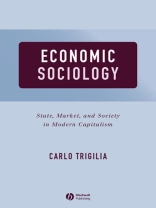This book systematically reconstructs the origins and new advances in economic sociology. By presenting both classical and contemporary theory and research, the volume identifies and describes the continuity between past and present, and the move from economics to economic sociology.
- Most comprehensive and up-to-date overview available by an internationally renowned, award-winning economic sociologist
- Systematically reconstructs the origins and new advances in economic sociology
- Organizes the perspectives and methods of economic sociologists of the classical and contemporary eras, including coverage of modernization, globalization, and the welfare state
- Provides insights into the social consequences of capitalism in the past and present for students of economic sociology.
Table des matières
Preface.
Introduction: What is Economic Sociology?.
Part I: The Classics and the Sociology of Capitalism:.
1. From Classical Economics to Economic Sociology.
2. The Origins and Developments of Capitalism: Simmel and Sombart.
3. Capitalism and the Western Civilization: Max Weber.
4. The Social Consequences of Capitalism: Durkheim and Veblen.
5. The Great Depression and the Decline of Liberal Capitalism: Polanyi and Schumpeter.
Part II: Themes and Routes of Contemporary Economic Sociology:.
6. The Legacy of the Classics and the New Boundaries between Economics and Sociology.
7. Modernization and Development of Backward Areas.
8. The Keynesian Welfare State and Comparative Political Economy.
9. The Crisis of Fordism and New Economic Sociology.
10. Globalization and the Diversity of Capitalisms.
Notes.
References.
A propos de l’auteur
Carlo Trigilia is Professor of Economic Sociology at the University of Florence. He is the author of Sviluppo senza autonomia. Effetti perversi delle politiche nel Mezzogiorno, which won the Amalfi European Prize in Sociology.












